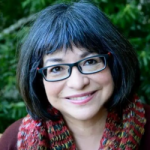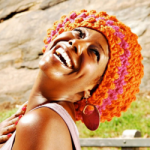
An Open Letter To Dark-Skinned Black Women Who Don’t Blush
Blushing is overrated. When I think of women who get red in the face (the cheeks and sometimes the forehead, too), I think of, well, white women.
Not blushing is probably nothing that you ever felt insecure about. You probably never envied your towheaded colleague, who’s all Renee Zellweger (back when she looked like herself) and Nicole Kidman (back when she looked like herself) and Naomi Watts wrapped into one, as she was giving a PowerPoint presentation at work but forgot one of her lines or was stumped by a tough question from your boss and the embarrassment made her face turn into a stoplight.
White women can have their blushing and all the conscious emotional advertising that comes along with it. (“Look at me, I’m nervous! Look at me, I’m flustered!”)
Before I continue down this road of appreciation for non-blushers, let me say: God bless the blushers. Seriously. If they get red in the face at the right time, the whole world is awwww-ing at their feet. “Look at you! You’re blushing. How cute!” Blushing is the kind of unexpected occurrence that can humanize you. It promotes spontaneous vulnerability. So, yeah. Good for the blushers. Like I said, God bless ‘em.
But I don’t want to be one. I’m like Maya Angelou who, according to Oprah legend, once said, “I feel sorry for anyone who’s not a black woman.” In the case of blushing, I’d amend the lament to say, “I feel sorry for anyone who’s not a dark-skinned black woman.”
If you’re like me, you might have felt at times that “blushing” is borderline racist. Like, not straight-up racist but not race-friendly. Because when you read an article in a women’s magazine that asks, “Do You Blush Easily?” you know instinctively that the “you” to whom they’re speaking is not you. Seemingly, the women who blush sit at the cultural inclusion table with the women who wear “nude” pantyhose. (So what if it’s not your nude, says Hanes and L’eggs.)
Frankly, as a dark-skinned black woman, I’ve always bristled at the generally accepted idea that face redness is a universal experience.
Google pimples.
Google fever.
Google herpes and cold sores.
What do you get? Red.
But any dermatologist worth his or her degree will tell you that redness as a symptom doesn’t apply to all skin tones.
Seemingly, the women who blush sit at the cultural inclusion table with the women who wear “nude” pantyhose.
In fairness, it might be that all humans do, in fact, blush. It seems reasonable that blushing is something we’re all physiologically wired to do, yet the change in color is virtually imperceptible in those of us with darker skin. Having not studied the how, when or why behind humans getting red in the face, I really can’t say. But I can say that, by my account, I can’t remember a time when anyone has ever said “Aww, look! Penny’s blushing!” Sure, my face has gotten flushed after workout. That color is far from a blushing pink or red, though. It’s a darkened tint that makes me look like an overripe blackberry.
So, no, I don’t blush. Call me in denial about a universal bodily function, the way some women claim they don’t poot (and “poot,” for the uninitiated, is my family’s less crass word for “fart”).
While I don’t blush, I do wear blush. Blush is my second favorite Sephora category (behind mascara, the equal-opportunity makeup product that, unlike foundation, is accessible to every skin color under the sun).
In my late twenties, I became addicted to blush, specifically a burnt coral color called “Peace” by Iman. Before that, it was Raisin by Mac. In my teens, there was some trial and error with the bright red options by Fashion Fair. For a time, I’d taken to wearing mauve lipsticks as blush because the powdery consistency of the real thing made me feel too made-up.
Blush has become the foundation of my beauty routine. For many years, Black women of a certain hue had the burden of feeling that blush made us look like clowns. The holy grail of makeup always being that you don’t want to look like you wearing too much of it or any at all.
See, I can get behind blush, the noun, the cosmetic. But blush the verb? It belongs to women of a certain complexion.
Look, my dark-like-me (and darker-than-I) sisters, I’m not gonna get all activist-y on you here. I’m not advocating for revised semantics or calling for the discontinued use of “blush” as a verb. We don’t needn’t start a BlackGirl social media movement. Besides, a silly hashtag like #BlackGirlsAgainstBlushing would only be met in anger with a #BlackGirlsWhoBlush hashtag counterargument from the multiracial and light-skinned.
So, let’s just keep it simple: The next time you see someone blushing, look around to see if there’s another dark sister nearby and smile when you catch her eye. Or wink. Or nod. Or whatever. Whatever gesture of solidarity you choose, make sure it says, in that moment, “Girl, aren’t you glad that’s not us!”
(Photo credit: Stocksy.com)
10 Responses
-

Susan “the women who blush sit at the cultural inclusion table with the women who wear “nude” pantyhose” <<THIS!
-
Yassy Black people blush, you just can’t see it on SOME dark skin women. My niece is a very beautiful dark skinned little girl and she DOES blush. she gets red in the sun and during emotional times. I was one that thought dark skin people could not blush or more that it couldn’t be seen , but I will tell you that is not true for all of them.
-
Blushinmama Thank you. My daughters and I all blush and we are all dark skinned. People get so surprised because our cheeks actually turn bright red and its very visibly red. Sad that when someone hears blushing they think of white when many people of many different skin tones blush.
-
Dennis Black people do blush. One girl said she saw me blushed I didn’t believe it. Until I saw a brown skin girl face turned a hot pink. I wondered where did the blood come from. When her face became normal, under her eyes stayed pink. It was an amazing sight.
-
-
Dennis Yaz we blush i used to think we didnt until i saw a brown skin girl face turn a hot pink. I have had serveral whotes whiites said that i turned red. But when o saw it. It blew me away.
-
-
Jaz Angel Well let me tell you I beg to differ I am a 58 year black woman and I have blushed my entire life when I was either angry flustered or embarrassed I wore the color red on my face, I felt the blood rising and I knew I was turning red but most of all I knew because of the astonished look people had to see a “black” woman blush! Oh my complexion is more on the lines of caramel
-
Dennis Starks i have been told by whites that i turned red. i thought W they was stretching the truth until i saw a brown skin woman face turn a hot pink in color. When I was in college, my friend and I saw a light skin women face turn bright red. My friend when he saw it, he said ” damn !”.
-
Blusher Great article. Yet, hurtful. I respect this viewpoint and completely agreed with the nude tone, etc. expectation of normalcy. I am mixed race, my father is West African and my mother is Swedish. I live in NYC, and have a darker mixed race completion. I always wanted to look like my father because I have severe anxiety and high blood pressure. The teasing, the rudolf comments….the blushing often has nothing to do with embarrassment. It just…happens. It’s something that I dread everyday and I’m tired of people asking if I’m “ok”. It’s led to isolation and social exclusion, so yes. Girl, I’m glad you personally do not have to deal with crippling social anxiety when presenting for work and folks ask if I’m ok because my face literally looks like a tomato. I wish we would all, as women, stop picking on each other.
-
Chris Bednarz LMAO!!! Will minorities in this country EVER stop finding things to whine and be insecure about? LOL.
-
gush Did you take this racism straight out of “titus andronicus” aaron’s self description, which is basically a racist lie he tells himself in the play?
Everyone blushes, enough black women laid me for me to know that. Different colors but still blushing.
And on high noon tropical lighting, their blushing is way more visible than white women, who’s faces (and butts) seem like apparitions. (I know I’ve been compared to ghosts, and worst of all, edward by black women who fetishized my whiteness because of that goddamn book. Thankfully I tanned.)Their cheeks just turn darker (as in hotter in color) and shinier.
The insides of their lips turn from a more bluish to a more purplish color. Outside gets more reddish, copperish, rustish. Even people’s nail’s coloring change.Also, same with men. But men are less prone to those color changes. And that includes gay men.
Not to mention ,the chubbier you are, the bigger the constrast.
Leave a Reply


Tell Us in the Comments
What do you think?